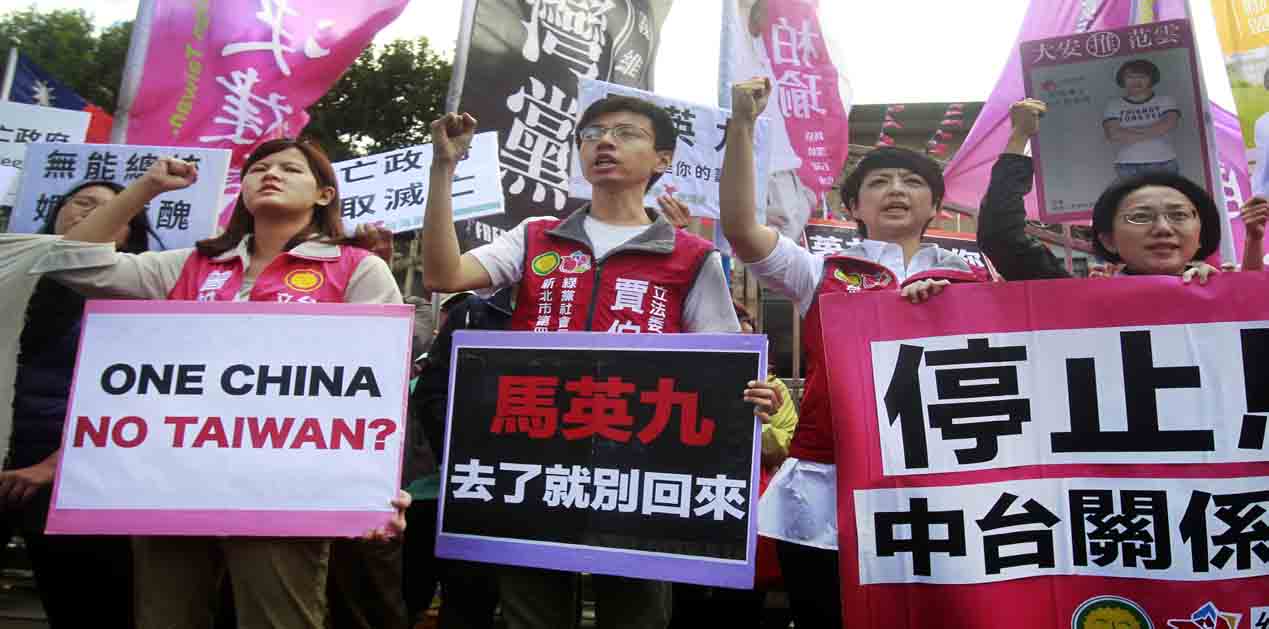On 18 October 2017 Xi Jinping delivered a speech at the 19th National Congress of the Communist Party of China. While speaking on the section of ‘Upholding One Country, Two Systems’ and ‘Moving towards National Reunification’, he mentioned about the cross-strait relations. He said, “The One-China principle is the political foundation of cross-Straits relations. The ‘1992 Consensus’ embodies the ‘One-China’ principle and defines the fundamental nature of cross-Straits relations; it thus holds the key to the peaceful development of relations between the two sided of the Taiwan Straits.” He also stressed that, “We will never allow anyone, any organisation, or any political party, at any time or in any form, to separate any part of Chinese territory from China.”
Commenting on the Xi Jinping’s stance Taiwan President Tsai Ing-wen said that “Now is an opportunity for change”. She further added, “Taipei and Beijing should work together to seek a breakthrough in their ties, create long-lasting benefits for their people and permanently defuse cross-strait hostility and people’s fear of war.” She acknowledged the fact that the reason for the stalemate in the cross-strait relations is the Democratic Progressive Party’s (DPP) stand of not recognizing the 1992 Consensus as the framework for the cross-strait relations. Further, as a response to Tsai Ing-wen’s statement, China’s Taiwan Affairs Office said, “The political basis for relations across the Taiwan Strait was the ‘One-China’ policy, which states that the mainland and Taiwan are part of one China.”
On 20 October 2017, Taiwan’s Chief Cabinet Minister Lai Ching-de responded directly by pronouncing Taiwan’s six “determinations”: Taiwan’s determination to defend Taiwan’s sovereignty will not change, Taiwan’s determination to defend and maintain its freedom, democracy, human rights and life will not change; Taiwan’s determination to develop its economy and make Taiwan stronger and greater will not change; Taiwan’s determination to seek common grounds through exchange while setting aside differences to deepen peaceful development between Taiwan and the Chinese mainland will not change; Taiwan’s determination to defend and maintain the right of the Taiwanese people to make future choices will not change; and Taiwan’s determination to defend regional peace and security will not change.
Seemingly, there is no change in China’s stance towards Taiwan in Xi Jinping’s speech. At the 18th Party Congress, Hu Jintao said, “We must adhere to the principle of ‘peaceful reunification and one country, two systems’ and the ‘eight–point proposal for growing cross-straits relations and advancing peaceful reunification of the motherland’. Notably, this time, Xi Jinping appeared to be much tougher than his predecessors. The palpable reason for this stance is the coming of a pro-independence party DPP to power. The overarching policy of the DPP is to deepen Taiwan’s relation with the US and Japan and diversify its trade with the South, Southeast and East Asia.
In January 2016, Tsai Ing-wen, leader of the DPP, won the election and became the President of Taiwan. The cross-strait relations were one of the central issues in the elections because the previous Guomintang-led government was very close to China. On the contrary, DPP supported independence for Taiwan. Since the beginning, Tsai Ing-wen has refused to acknowledge the One-China policy and has maintained ambiguity over the 1992 Consensus. She does not consider it as the only option for dealing with China, rather considers this issue to be related to the identity of Taiwanese citizens and believes that it requires the full understanding and participation of the people. Notably, in her first National Day speech in 2016, she did not use the term ‘1992 Consensus’; instead she said, “We respect the historical fact that in 1992 the two institutions representing each side across strait held a meeting.” Stressing on the identity of Taiwan in her speech, she used the word “country” instead of the “island nation”. As she came to power, the cross-strait relations have been deteriorating, China has cut-off its official communication with Taiwan, the Mainland Affairs Council. There are no official channels between the two sides.
Taiwan is a critical issue for China. It is one of the “core interests” along with Tibet, Xinjiang and the South China Sea. Xi Jinping, in his speech, has once again made it clear that recognising the 1992 Consensus is the pre-condition for China to resume the dialogue mechanism. In all possibility, China will increase its pressure on Taiwan. It has already tried to stop Taiwan’s participation in the international organisations like the International Civil Aviation Organisation and World Health Assembly. China has pressurized countries like Panama to cut-off its diplomatic ties with Taiwan as a pre-condition to establishing its ties with China. Besides limiting Taiwan’s diplomatic space, China is trying to discourage Chinese tourists from visiting Taiwan. This has resulted in 30 percent decline in Chinese tourist to Taiwan since May 2016.
Overall, the recent development indicates that cross-strait relations will be rocky in coming times.
(Views expressed are of the author and do not necessarily reflect the views of the VIF)
Image Source: https://www.japantimes.co.jp/news/2015/11/04/national/politics-diplomacy/beijings-pragmatic-taiwan-china-summit-implications-japan/#.WgJ7ZrXhWM8










Post new comment